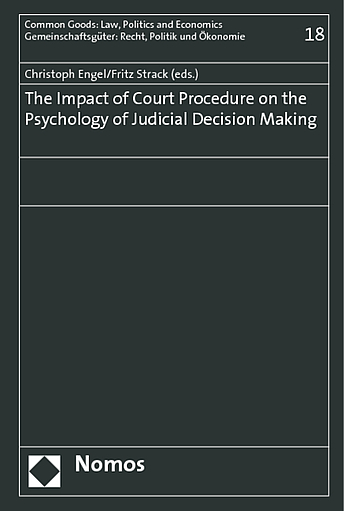englischProcedure matters, granted. But why, and how? There is hardly another context in which decision-making is that densely embedded in a host of formal and informal institutions. Courts do not themselves have the right of initiative. They must wait until a plaintiff or the attorney general brings a case. These actors do also define the issue. The court is not allowed to go beyond the claim, unless both parties voluntarily agree on a broader definition. Most importantly, courts are not free to determine the output. It is their task to apply the law in force to the facts of the case, as presented by the parties. The potentially applicable substantive rules do thus delineate the solution space. In order to become decision relevant, facts must go through strictly defined procedural routes. If a fact is contested, it may only be taken into account if formally proven. There is an exhaustive list of evidence admissible in court. Informal rules for instance determine the structure and the wording of the pleadings, and of the representation of the final decision to the parties and to the legal community.
This makes judicial procedure a particularly rewarding topic for the interaction between lawyers and psychologists. A group of academics from the US and Germany has come together in the beautiful surroundings of the Bavarian monastery "Kloster Seeon". This volume assembles the products that have resulted from the lively interaction.
Wie kommt es zu richterlichen Entscheidungen? Wie wirken juristische Normvorgaben und Vorbewertungen der Richter zusammen? Und wie entscheidend für das Ergebnis ist es, wer die Rolle der "Regelsetzer" im Prozessverlauf einnimmt?
Der Band dokumentiert die Ergebnisse, die aus einem lebhaften Dialog zu diesen Themen zwischen Wissenschaftlern aus den USA und Deutschland entstanden sind. Dabei wurde klar: wer z. B. zuerst eine Zahl für das Strafmaß nennen darf, setzt einen Anker, der die Bandbreite der Entscheidung definiert. Letztlich ringt sich der Richter im Vorfeld und im Stillen zu seiner Entscheidung durch, ist sich aber dabei stets bewusst, dass er seine Entscheidung später kunstgerecht begründen muss.
Für die Wirksamkeit des Rechts sind das allerdings nur Nebenfolgen. Die eigentliche Wirkung liegt im freiwilligen Rechtsgehorsam. Für die Bereitschaft, Rechtsregeln einzuhalten, allein deshalb weil sie gelten, ist ein Umstand so bedeutsam wie kein anderer: Wie hat sich der konkrete Bürger bei seinen seltenen direkten Begegnungen mit Justiz oder Verwaltung behandelt gefühlt?



